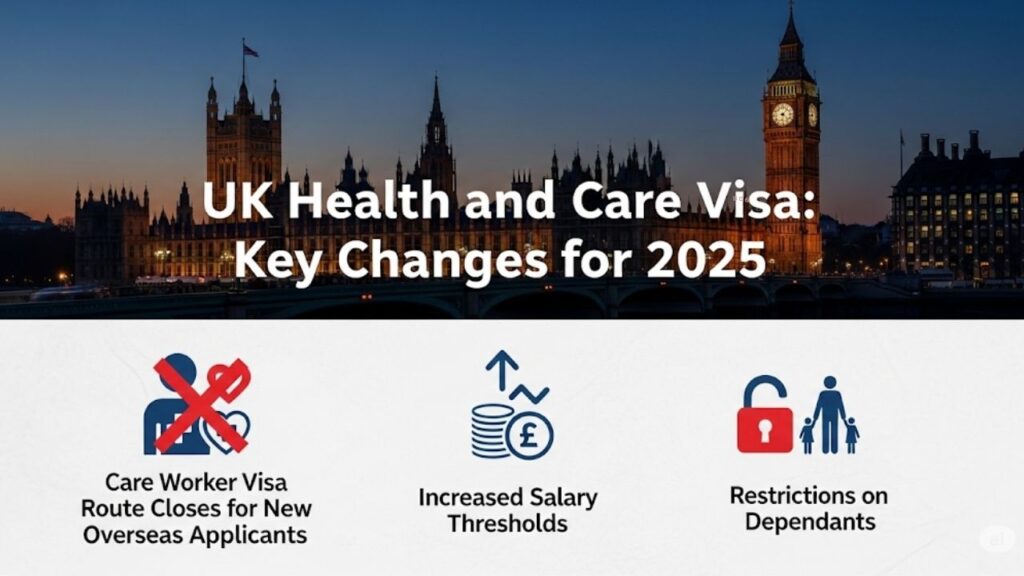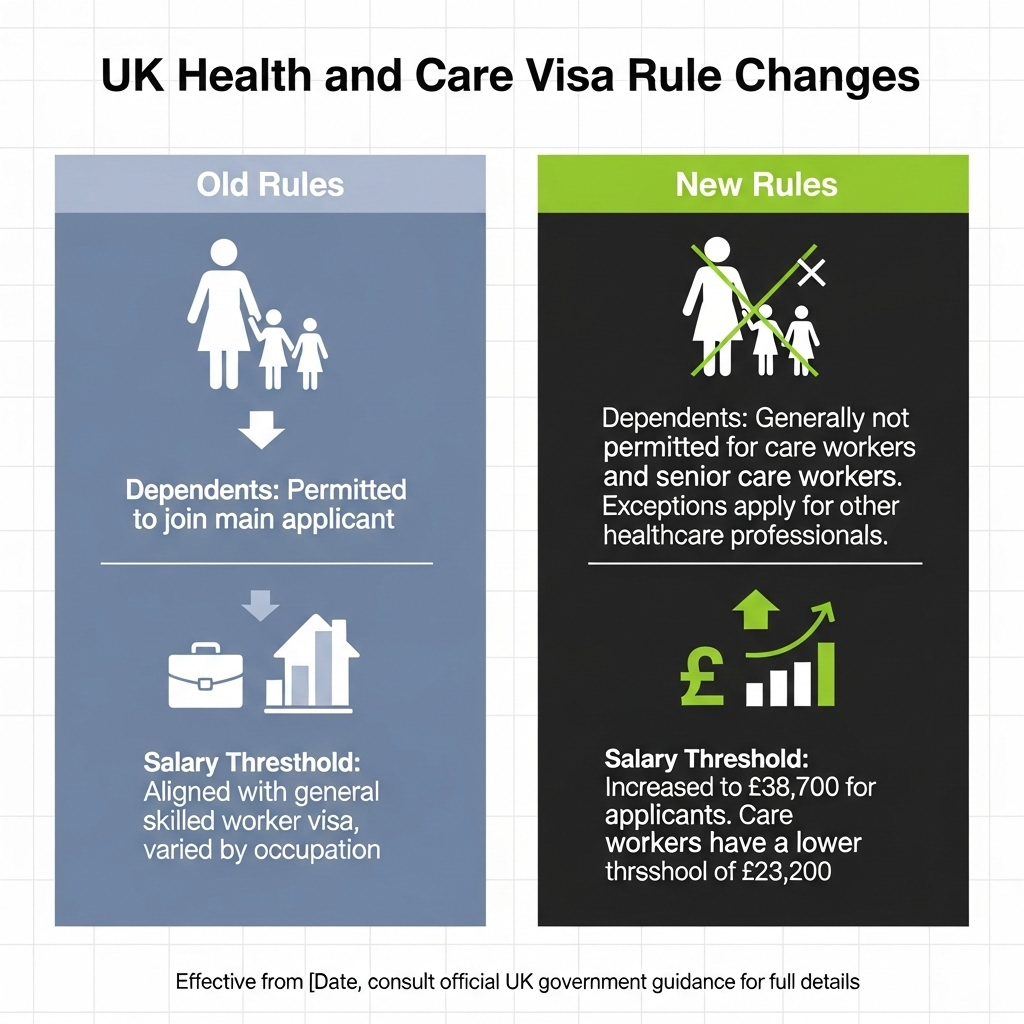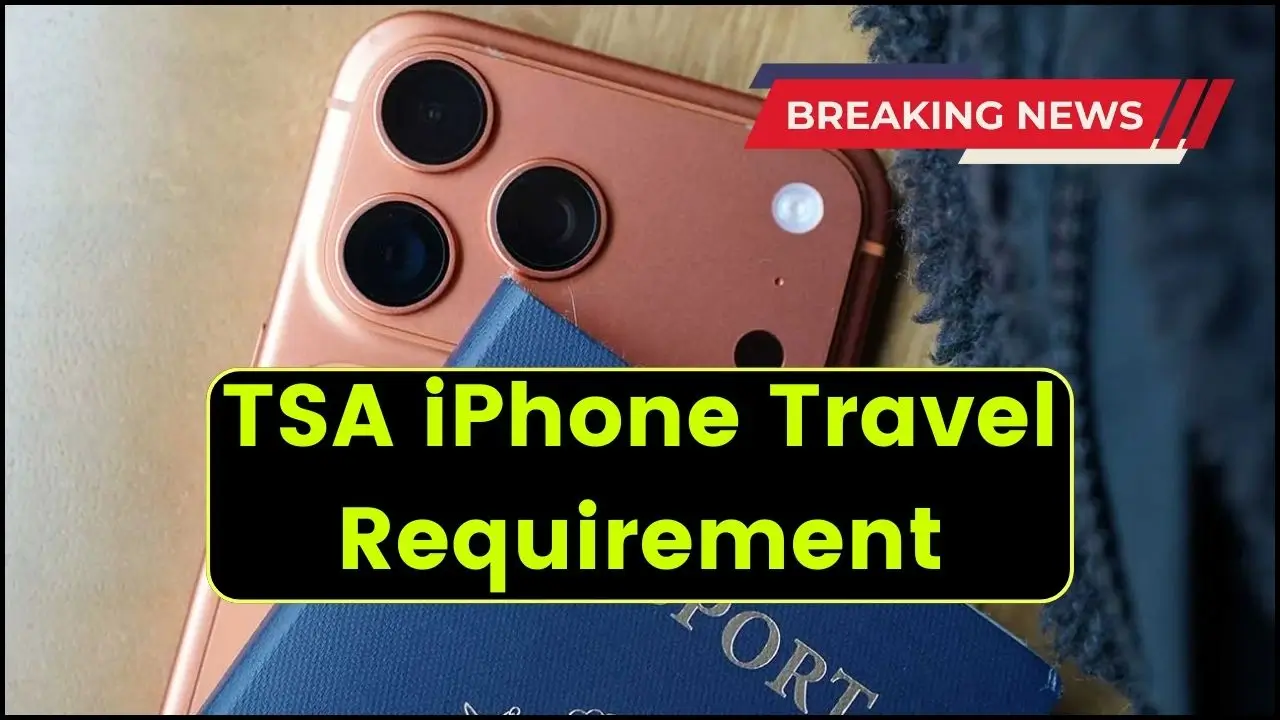The UK Health and Care Visa changes 2025 might feel like a new, complex map to navigate. If you’re a dedicated healthcare professional dreaming of a career in the UK, you might be wondering what these updates mean for your journey. Let us assure you: while the path has new signposts, the destination is still very much within reach. This guide is designed to be your trusted companion, breaking down every change, clarifying the requirements, and providing you with a clear, actionable plan for success.

UK Health and Care Visa changes 2025
| The Change | What It Means for You |
| New Salary Threshold | The minimum salary requirement has increased to £29,000 per year for most roles. GOV.UK |
| Dependent Restrictions | Care workers and senior care workers can no longer bring dependents (partners, children) on their visa. |
| Regulated Sponsors | Care providers in England must now be regulated by the Care Quality Commission (CQC) to sponsor workers. CQC Website |
Navigating the UK Health and Care Visa changes 2025 is about understanding the new rules and preparing meticulously. The key takeaways are the new £29,000 salary threshold (with exceptions for national pay scales), the dependent restrictions for care workers, and the CQC registration requirement for care-sector sponsors.
Your dream of working in UK healthcare is an ambition worth pursuing. By focusing on securing a role with a licensed sponsor, carefully preparing your documents, and approaching the application with confidence, you can successfully take this next step in your professional life. Your skills are needed, and your journey is just beginning.
Understanding the Core Changes: What’s New for 2025-26?
The landscape for international healthcare recruitment has shifted. The UK government implemented these changes to create what it calls a “more sustainable and ethical” immigration system. But what does this mean for you, the applicant? Let’s break it down into simple, manageable pieces.
The New Salary Threshold: A Detailed Look
Perhaps the most talked-about update is the increase in the general salary threshold. For most applicants under the Health and Care Worker visa, the new minimum salary you must be offered is £29,000 per year.
However, there’s important nuance here. If your specific job is on a national pay scale (like the NHS Agenda for Change), you’ll only need to meet the rate for that pay band, even if it’s below £29,000. For example, many nursing roles fall into this category.
- What to do: Scrutinise your job offer. Ensure the salary meets either the £29,000 general threshold or the appropriate national pay scale rate for your role. Don’t be afraid to discuss this with your potential employer.
Changes to Dependents for Care Workers
This is a critical change that primarily affects those in the care sector. As of the new rules, individuals applying for a visa as a care worker or senior care worker are no longer able to bring dependents (spouses/partners and children) with them to the UK.
It’s important to be clear: this restriction is specific to those with occupation codes 6145 and 6146. It does not apply to other healthcare roles like nurses, doctors, or occupational therapists. In my experience advising healthcare professionals, this has been the most emotionally challenging change for applicants, and it requires careful family planning.

A Stricter Framework for Sponsoring Employers
To ensure high standards of care and protect workers, a significant new rule has been introduced. Care providers in England who wish to sponsor a Health and Care Worker must now be registered with the Care Quality Commission (CQC), the independent regulator of health and social care in England.1
This is a positive step for you as an applicant. It means that any care home or agency offering you a Certificate of Sponsorship (CoS) has met a certain standard of quality and regulation, offering you a greater layer of protection.
Are You Still Eligible? UK Healthcare Worker Visa Requirements Updated
With the changes in place, let’s refresh our understanding of the core requirements. The foundation of a successful application remains the same: a genuine job offer, the right qualifications, and meticulous preparation.
Checking the Eligible Occupations List
Your role must be listed as an eligible occupation for the UK Health and Care Visa. This list is extensive and includes professions from doctors and nurses to pharmacists and physiotherapists. The government maintains a definitive list tied to specific four-digit Standard Occupational Classification (SOC) codes.
A common point of confusion is whether a specific job title qualifies. The key is not just the title but the duties of the role. Your employer will confirm this when they issue your Certificate of Sponsorship.
- Actionable Tip: You can view the full list of eligible healthcare and education occupation codes on GOV.UK. Check this list carefully against the role you are applying for.
English Language and Financial Requirements
These two pillars of the visa application remain firmly in place.
- English Language: You must prove you can read, write, speak, and understand English to a certain level (typically B1 on the CEFR scale). You can do this by:
- Passing a secure English language test (SELT) from an approved provider.
- Having a degree that was taught or researched in English.
- Being a citizen of a majority English-speaking country.
- Financial Requirement (Maintenance): You need to show you can support yourself upon arrival in the UK. This usually means having at least £1,270 in your bank account for 28 consecutive days before you apply. However, many sponsoring employers, particularly the NHS, will often certify your maintenance on your CoS, meaning you don’t need to provide bank statements. Always confirm this with your employer.
The Crucial Role of the Certificate of Sponsorship (CoS)
Think of the Certificate of Sponsorship (CoS) as your golden ticket. It’s not a physical certificate but a unique reference number provided by your UK employer, who must hold a valid sponsor licence. This number confirms that you have a genuine job offer and that your employer will sponsor your visa. Without a CoS, you cannot apply.
I’ve seen many successful applicants build a strong relationship with their sponsoring employer early on. This communication is key to ensuring the details on the CoS are perfectly accurate, which prevents delays down the line.

Your Step-by-Step Application Guide for the 2025-26 Cycle
Feeling ready? Let’s walk through the process together.
Step 1: Secure Your Job Offer and CoS
This is the foundational step. Focus your energy on finding a role with an approved sponsor. The NHS Jobs website is the primary portal for clinical roles, while many reputable private healthcare groups and care providers advertise on major UK job boards. Once you accept an offer, your employer will work to assign you a CoS.
Step 2: Gather Your Essential Documents
Preparation is everything. While waiting for your CoS, start assembling your file. You will typically need:
- Your passport
- Your Certificate of Sponsorship reference number
- Proof of your English language ability
- A valid Tuberculosis (TB) test result, if you’re from a listed country
- A criminal record certificate from any country you’ve lived in for 12 months or more over the last 10 years
- Your UK job offer letter and details of your role and salary
Step 3: The Online Application & Biometrics
Once you have your CoS, you can begin the online application on the GOV.UK website. The form is straightforward but requires careful attention to detail. After submitting and paying the fee, you’ll be asked to book an appointment at a visa application centre to provide your fingerprints and a photograph (biometrics).
A Positive Outlook: The Enduring Opportunity
While the rule changes require adjustment, the UK’s need for skilled, compassionate healthcare workers has not diminished. The National Health Service (NHS) and the private care sector continue to be among the world’s largest employers of international staff. These roles offer incredible opportunities for professional development, a chance to work in a world-renowned healthcare system, and a vibrant, multicultural life experience.
The changes are designed to streamline the system and focus on filling critical gaps. For nurses, doctors, allied health professionals, and many others, the path remains open and the welcome remains warm.
Your Ultimate Guide to Working in the UK on a Student Visa: University of Leeds’ June 2025 Rules
FAQs
Q1: Do the new rules affect my visa if I’m already in the UK on a Health and Care Visa?
Generally, no. If you are already in the UK on a visa route that permitted dependents, you will still be able to have your dependents stay with you and apply to extend their visas. The new rules primarily affect those making their first application from outside the UK after the changes were implemented.
Q2: Can I still bring my family with me on a Health and Care Visa?
Yes, unless you are applying for a role as a care worker or senior care worker. For all other eligible roles, such as nurses, doctors, and therapists, the rules allowing you to bring a dependent partner and children have not changed.
Q3: How do I find a sponsoring employer in the UK?
The best place to start is the official NHS Jobs website. For private sector roles, use major job portals like Indeed, Reed, or LinkedIn, and filter for jobs that offer “visa sponsorship.” Additionally, many specialised healthcare recruitment agencies can connect you with licensed employers.
Q4: Is the £29,000 salary threshold absolute for all healthcare jobs?
No. While it is the new general minimum, there is a crucial exception. If your job is on a national pay scale, such as the NHS Agenda for Change, you only need to be paid the appropriate rate for that role, even if it is less than £29,000. Many entry-level clinical roles fall into this category










